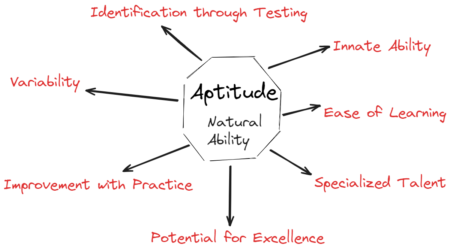Aptitude & its Characteristics
Aptitude: Person’s Natural Ability
Aptitude refers to a person’s natural ability or talent to perform certain tasks efficiently without prior experience or training. It’s like an inborn potential that, when nurtured, can lead to expertise in a specific area. Aptitude is not just about having a knack for something; it’s about how quickly and effectively one can learn or adapt to new tasks within a particular domain.
Key characteristics of aptitude with examples
1. Innate Ability:
Aptitude is often considered an inherent quality. It’s something you’re born with, like a natural flair or talent for doing something.
Example: Some people have a natural aptitude for music. They can pick up rhythms, understand melodies, and even play instruments without much formal training.
2. Ease of Learning:
People with a specific aptitude can learn and master skills in their area of talent more quickly and easily than others.
Example: A person with a mathematical aptitude can grasp complex mathematical concepts and solve problems more swiftly and efficiently than those without such an aptitude.
3. Specialized Talent:
Aptitude is often specific to certain fields or activities. It’s not a general ability but rather a specialized talent that applies to particular tasks or areas of interest.
Example: Someone might have an aptitude for languages, enabling them to learn and master new languages more easily than others.
4. Potential for Excellence:
Having an aptitude for something means there’s a potential to excel in that area, often beyond the average level of skill or competence.
Example: An individual with an aptitude for sports might not only play well but also have the potential to become a professional athlete.
5. Improvement with Practice:
While aptitude provides a strong foundation, improvement and mastery still require practice and dedication. People with aptitude can achieve higher levels of skill more quickly, but they still need to work to develop their talents.
Example: A person with a natural aptitude for painting will still need to practice their art regularly to improve their technique and expressiveness.
6. Variability:
Different people have aptitudes for different things, and it’s rare to find someone who has a high level of aptitude in many unrelated areas.
Example: Someone might have a high aptitude for logical reasoning but not for creative writing, or vice versa.
7. Identification through Testing:
Aptitudes can often be identified through specific tests designed to measure potential abilities in various fields.
Example: Aptitude tests may be used in educational settings to guide students towards subjects or careers where they are likely to excel.
Understanding and recognizing one’s aptitudes can be crucial for personal and professional development. It allows individuals to focus on their strengths, pursue relevant opportunities, and achieve greater success and satisfaction in their endeavors.


